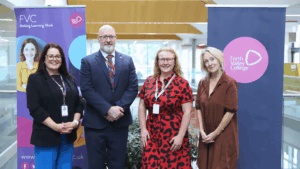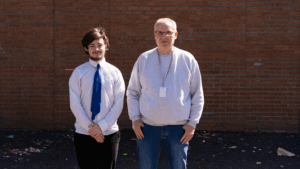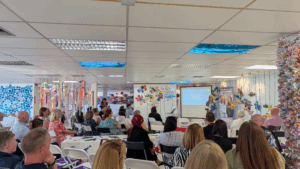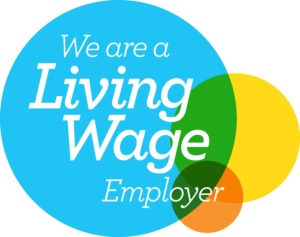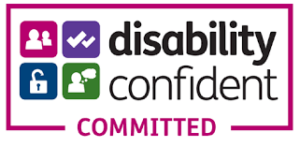

If there’s one difference I’ve made to Aaron Easton’s life, it’s that when he picks up his mobile phone in the morning there are two words on its screen: Think Strategically.
I’ve made a few others. He’s starting to write the letter p with a descender, not least because it helps him read his own handwriting. In theory, he now knows what “synecdoche” means, though like me he’ll probably forget. He was the best at Norman MacCaig’s poetry in sixth-form class at St Augustine’s secondary school in Edinburgh, and I (and the Scottish Poetry Library) helped a bit with that. He promises me that one day he’ll try to understand fractions, percentages and multiplication tables, though strictly speaking maths was off the table, because the only exams he was taking before he left school were in English, Media Studies, Drama, and Religion, Morality and Philosophy Studies.
If you stretch the point about religion and morality, the 15 years I spent as this newspaper’s books editor covered most of that. So when MCR Pathways was looking for someone I could help as a volunteer mentor, Aaron seemed a good match. (They take their time to get these things right: after going through all the necessary training and background checks, I’d been on their books for a full year.)
We got on well. In June last year, when we first met, I asked Aaron whether he’d seen any of those TikTok clips about people using those punchbags that electronically measure how hard they hit. That’s what we’re going to do with your exams, I told him. We’ll get those numbers soaring. He smiled politely.
So I studied almost everything he did. Maybe I didn’t need to. Maybe all that the charity MCR Pathways really wanted from me as a volunteer mentor was someone who would just listen and be sympathetic in the one hour that we’d meet each week at the school. I did that too. But I wanted to help Aaron as much as I could, and I don’t regret it for a second. It’s one of the better things I’ve done with my life.
MCR Pathways is such a brilliant charity that only a government actively committed to widening educational opportunity gaps would ignore it. It was set up in 2007 by Glasgow entrepreneur Iain MacRitchie who wanted to find an answer to a very simple question: how can we help kids with fewer life chances, invariably in poor areas, to achieve their potential. What actually works?
The answer, according to MCR, is quite simple and it doesn’t cost much. Just one adult volunteer mentor chatting to their mentee – always at their school, never outside – for one hour a week.
I’m not surprised it works. Before my year with Aaron I spent several years as a volunteer with the equally excellent Super Power Agency (SPA) in Edinburgh. While mentoring with MCR is 1:1, with the Super Power Agency there might be as many as half a dozen adult volunteers (again, all having passed the necessary checks) sitting alongside the pupils in creative writing classes in both primary and secondary schools to produce published books of their own stories.
Both charities’ work results in clear and quantifiable results in pupils’ self-confidence and academic performance. With both, costs are minimal (whether we’re former journalists, trainee teachers, would-be writers or whatever, we’re all volunteers). And that matters: it’s a big plus that we’re not part of the school set-up. “You mean you do this for no money?” I’d be repeatedly asked in schools working on SPA projects, with expressions ranging from scorn (10 per cent) to an impressed “I suppose we must be worth it” (90 per cent).
Astonishingly, officialdom doesn’t seem to care. Despite its proven track record on literacy levels in schools in deprived areas, Super Power Agency hasn’t had a penny from the Scottish Government. And only this month Glasgow City Council has stopped funding half the cost of the MCR Pathways’ volunteer co-ordinators, despite having worked with the charity since 2007. Some 2,000 pupils in 30 schools – the very ones with the worst starts in life in the whole city – are affected.
What’s going on? This is civic and educational vandalism. MCR can point to evidence that 87.7 per cent of the pupils they mentor – many of them care-experienced – get one or more SCQF Level 5 qualifications. The figure for their non-mentored peers is 66.8 per cent. Stats for mentored pupils going on to employment or higher education are similar. The difference made by that one hour a week with a mentor is unbelievable.
There’s more to MCR than Glasgow – indeed, its 31 schools form just a quarter of those now on the charity’s books. But Glasgow is where its transformative effects were first proved. Stop funding those volunteer co-ordinators – the people who hold the whole programme together – and its poorest children’s life chances take a massive hit. No mean city? Huh. Leave no child behind? Pull the other one.
In Edinburgh, my MCR volunteer co-ordinator was called Jessica. She was great. One of the reasons is that when she was telling me about Aaron she didn’t tell me he’d been diagnosed with autism and ADHD. She may have told me that he was probably “somewhere on the spectrum”, but not much more.
As a result, I didn’t start off with any assumptions. But I did learn to recognise how his mind raced when there was no ADHD medicine to be had in Edinburgh between December and January. This is where “think strategically” came from: don’t go down all those rabbit holes; work out what you need to know and stick to it. Half of his friends have mental health problems, he told me. I’m not surprised. We live in a country that has seen a 20-fold increase in ADHD diagnoses among young men between 2000 and 2018, with a near-50-fold increase in prescriptions.
Aaron is a bright lad, open-hearted, honest and kind, a credit to his family. He is also religious, and was baptised into the Seventh Day Adventist church during our year. The service was put on YouTube and I was moved to tears when I watched it, not least by his wonderfully confident and eloquent address to the congregation afterwards. Even though I’m an agnostic, I could see the hope and love reflected back. He’s thinking of being a minister and I reckon he’ll be a very good one.
In that year with Aaron, I didn’t just learn about his life and experience of school. We also read Sophocles’s Antigone (did you know it’s the most performed play in the world?), worked out whether or not the Apple Vision Pro would change the future, and enjoyably chewed over Orwell’s ‘A Hanging’. And so much more.
When Higher results came out this week, Aaron got pretty much the grades predicted for him at the start of our year and will be starting an HNC in television multi-camera operation at Edinburgh College next month. But although I hadn’t boosted his numbers as much as I had hoped, Aaron was kind enough to say that he found the whole mentoring process “miraculous”. So, in my more agnostic way, did I.
